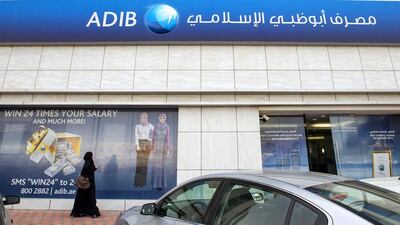Abu Dhabi Islamic Bank said it would raise its capital and tap more sukuk to help it fund growth plans that include beefing up its business in Egypt and other emerging markets.
The lender, also known as ADIB, said it is seeking to raise Dh504 million by offering new shares to existing shareholders as well as taking on more Islamic debt by increasing its so-called tier 1 capital instruments program to US$3 billion from the existing approved limit of $2bn. That comes as a period of rapid expansion for the bank has left its so-called capital ratios tighter than its peers, analysts say. Shares of ADIB, which can only be bought and sold by UAE nationals, rose 1.4 per cent to Dh5.10 on the news making it one of the best-performing stocks on the Abu Dhabi Securities Exchange yesterday.
“ADIB has experienced a period of strong expansion and we expect this growth trajectory to continue,” Tirad Al Mahmoud, the bank’s chief executive, said at a news conference at the bank’s headquarters in Abu Dhabi. “In order to support our growth, the bank is looking to raise additional capital and as such we are inviting our shareholders to participate in a rights issue. We are committed to maintain a solid capital base “
Mr Al Mahmoud declined to comment on whether the move to bolster its capital base was related to its bid to buy the retail banking network of Citibank Egypt.
ADIB, Abu Dhabi’s biggest Sharia-compliant lender, has been shortlisted as a buyer for Citigroup’s Egypt retail business in what is set to be a heated battle to tap into one of the world’s fastest-growing economies. The lender has had a presence in Egypt since 2007.
Citi has been quitting its retail businesses in countries where it no longer has a competitive edge, while UAE lenders are spreading their wings into nearby emerging markets such as Egypt to boost earnings amid slower growth at home. Emirates NBD is also reportedly bidding to buy Citi’s Egypt consumer banking network while Mashreq is said to have dropped out.
UAE banks are set to feel the pinch from a dramatic drop in oil prices as demand for loans slows, analysts including those at Standard & Poor’s have warned. The price of crude, upon which Arabian Gulf countries fuel their growth, has lost more than 40 per cent of its value since last June.
Meanwhile, Egypt, which is coming out of an economic slump after four years of political turbulence during which two presidents were removed following popular uprisings, has attracted a multitude of investors betting on robust growth. The country, a net oil importer, will also be boosted from the drop in crude prices.
ADIB, which also has operations in Saudi Arabia, Sudan, Qatar, Iraq and the UK, said it would hold an extraordinary general meeting on June 21 to approve the capital raise and vote on the proposal to increase its capital instruments programme. A timetable for the rights issue will follow an approval, it said.
For the rights issue, the bank proposes to issue 168 million new shares at a price of Dh3 per share.
“ADIB’s capital ratio was starting to look a bit light as compared to peers because of the very strong growth of the bank, as the bank was gaining market share and the bank needed to address it, particularly as regulatory minimums continue to increase,” said Jaap Meijer, managing director at the Dubai-based investment bank Arqaam Capital.
mkassem@thenational.ae
Follow The National's Business section on Twitter

